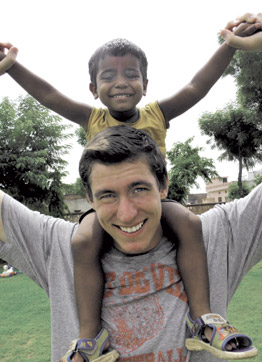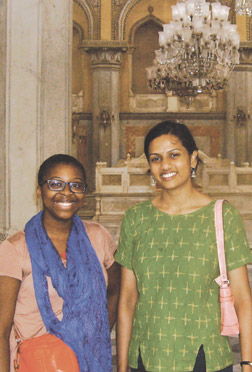Pitt Summer Research Abroad Program Helps Undergrad Scholars See Part of the World, Widen Their Aspirations
 Pitt senior Michael Gowen with one of the children at the orphanage in Jaipur, India.
Pitt senior Michael Gowen with one of the children at the orphanage in Jaipur, India.For Michael Gowen, a Pitt neuroscience senior, the enormity of the poverty—and the challenges it presented—seemed simply overwhelming.
There he was in rural Jaipur, India, spending a week in an orphanage that was home to 22 children—all diagnosed with human immunodeficiency virus (HIV), which leads to AIDS—who either had no known parents or whose parents were too sickened by AIDS to care for them. The orphanage did the best it could to provide for its young charges, noted Gowen, but many things fell short: broken ceiling fans, children’s clothing that was literally falling apart, and shockingly poor diets.
During his stay, Gowen raised some money from friends and family and was able to buy some new clothes for the children. He also arranged for periodic fruit deliveries for the next few months, repaired the ceiling fans, and even had enough to pay advance school tuition for nine of the children.
“Before I left for India, I saw myself graduating from medical school, completing a residency in surgery or anesthesiology, living in a beautiful home, and enjoying the financial rewards of my work,” Gowen wrote in an e-mail. Then he thought about what he was able to do for the children in the orphanage with only a few thousand dollars and no medical training. “I thought about the important things I could do after I was medically trained and had more money to give. … I thought to myself, ‘Maybe this is what I was destined to do.’”
Gowen was one of 12 Pitt students who participated this past summer in the new Summer Research Abroad program, sponsored by the University of Pittsburgh’s University Honors College (UHC).
“During the summer months, many students understandably leave campus and go home to places distant from Pittsburgh, while some students stay on campus and work in research laboratories or on scholarship projects,” said UHC Dean Edward M. Stricker. “A small subset of students would like to pursue work that is unavailable on campus but is available abroad. The UHC Summer Research Abroad Program provides support for the latter group of students.”
The program was conceived in summer 2010—a year prior to Stricker’s assuming his new position as UHC dean last month—by Steven Husted, UHC interim dean and professor of economics. Husted worked with David Hornyak, UHC director of advising, and the University Center for International Studies (UCIS) to get the initiative under way.
“The program’s purpose,” Husted said, “is to encourage undergraduates to conduct international research that they would have been unable to do otherwise.”
The UHC invited proposals from students, requiring that applicants have a faculty member write a letter of support explaining why the international component was crucial to the research. Students received a stipend of $3,500, plus $1,500 for expenses.
Wide Range of Research
Gowen’s research program was titled “HIV/AIDS in Rural India: An Epidemiological Study Comparing the Manifestation, Treatment, and Culture Factors of HIV/AIDS in Rural India, Compared to Urban India.”
Other Pitt students also learned about making a difference this summer.
Margo Lynch, an Italian and history senior, spent her summer researching Sub-Saharan African immigration and assimilation in Sicily, Italy. “What this has actually translated to is combing the city and nearby coast for interview subjects, pleading with heads of the Immigration Office to speak with me, and doing various other volunteer work at two of the city’s refugee centers,” she said.
A typical day for Lynch consisted of a bike ride to the Stella Maris Center, which works with immigrants, followed by a trek to the tourist beaches to search for recently arrived Africans. Then, she said, she ended the evening with the “new arrivals,” exchanging languages, general discussions, and kicking around a soccer ball.
 Zoe Samudzi (left), a Pitt sophomore majoring in political science, stands in Chowmahalla Palace in Hyderabad, India, which was the seat of a Persian dynasty that once ruled in Andhra Pradesh. Samudzi was in India doing research on how Indian people in the Andhra Pradesh region age. She is standing with Niranjani Thuppal, a second-year Pitt medical student.
Zoe Samudzi (left), a Pitt sophomore majoring in political science, stands in Chowmahalla Palace in Hyderabad, India, which was the seat of a Persian dynasty that once ruled in Andhra Pradesh. Samudzi was in India doing research on how Indian people in the Andhra Pradesh region age. She is standing with Niranjani Thuppal, a second-year Pitt medical student.Political science sophomore Zoe Samudzi worked in Andhra Pradesh, India, on the MILES study—a longitudinal cohort study that Pitt is doing with MediCiti Hospital. Samudzi assisted the Pitt epidemiological students in Andhra Pradesh with their research, which aims to assess the manner in which Indian people 60 and older in that region are aging.
“We’re looking to figure out the prevalence of age-related chronic diseases in the elderly, as well as the way that socioeconomic and environmental risk factors contribute to these age-related chronic diseases,” wrote Samudzi.
Michelle Everson, a global studies major with a concentration in conflict resolution, spent her summer in Northern Ireland studying the negotiations that resulted in the Good Friday Agreement, which marked the end to the Troubles—a period of ethno-political conflict in Northern Ireland.
“One theory in conflict studies is that conflict sometimes can’t be ended, just transformed,” she said. “That is certainly true in Northern Ireland. Its inspiring to learn about what was achieved in 1998, but even more amazing to see people—even former combatants—working every day to make sure that the peace holds, trying to transform the society so that there will never be a return to violence. That’s the kind of work I want to do.”
Expanded Horizons
Like Gowen, some students said their experience has significantly influenced their thinking about future plans.
Samudzi, who worked on the aging study in India, said she plans to apply to Pitt’s Graduate School of Public Health to obtain the Master of Public Health degree. She also hopes to work for the World Health Organization.
“Since life expectancies all over the world are increasing, for the most part, the study is addressing a universally relevant issue,” she wrote.
Lynch said she is fluctuating between several future options. “To be honest, my time abroad is constantly affecting my future plans. It seems every two weeks I’m changing my mind about what I want to do, torn between going to grad school in Cairo, doing humanitarian work for zero pay in Africa, and coming back here to Sicily,” Lynch wrote in an e-mail. “Developing this project has inspired me to seriously consider applying for a Fulbright [Scholarship] to continue my work. Also, the Italian government has just recently opened up a new center on the outskirts of the city to help young African men fleeing the crisis in Libya. After graduating this year, I may have the opportunity to work there.”
Neal Godse, a neuroscience major, said he remains committed to going to medical school following his graduation from Pitt. He studied Parkinson’s disease treatments in rural and urban India. “Though working abroad has not changed this goal, what it has done is made me want to work internationally as a doctor regularly,” he said. “I want to learn what doctors around the world have to share, and I want to share my knowledge as well.”
Follow the adventures of the UHC Summer Research Abroad students at https://www.facebook.com/pages/University-of-Pittsburgh-Honors-College/118106091568424.
Other Stories From This Issue
On the Freedom Road

Follow a group of Pitt students on the Returning to the Roots of Civil Rights bus tour, a nine-day, 2,300-mile journey crisscrossing five states.
Day 1: The Awakening
Day 2: Deep Impressions
Day 3: Music, Montgomery, and More
Day 4: Looking Back, Looking Forward
Day 5: Learning to Remember
Day 6: The Mountaintop
Day 7: Slavery and Beyond
Day 8: Lessons to Bring Home
Day 9: Final Lessons

